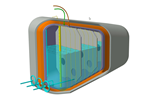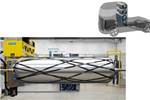ZeroAvia and Absolut Hydrogen partner to develop liquid hydrogen refueling infrastructure for aircraft operations
Partnership supports development of LH2-powered aircraft with up to 80 seats by 2027 and robust airport infrastructure.
Photo Credit all images: ZeroAvia
ZeroAvia (Kemble, U.K.), which is developing zero-emission solutions for commercial aviation, and Absolut Hydrogen (Seyssinet-Pariset, France), which is commercializing liquid hydrogen (LH2) technologies for various mobility sectors, today announced a partnership to jointly explore LH2 production, storage and refueling at airports.
The partners will work together to build and demonstrate H2 liquefaction and LH2 storage in an airport context and ultimately explore the technology developments, concept of operations, safety procedures and standards for larger-scale deployment to deliver LH2 to aircraft.
Grenoble-based Absolut Hydrogen, a subsidiary of Groupe Absolut, describes itself a world leader in developing LH2 systems for heavy-duty mobility in aeronautical, maritime and land applications, building upon Groupe Absolut’s expertise and deep industry knowledge in complex cryogenic systems. Absolut Hydrogen is offering a full LH2 product range with an entry small scale H2 liquefaction system (< 50 kilogram/day), a 100 kilogram/day Turbo-Brayton based H2 liquefier and a 1 tonne/day H2 liquefier based on the same technology.
While ZeroAvia’s first certified powertrains for aircraft with up to 19 seats will be powered by compressed gaseous hydrogen (CGH2), the ZA2000 — a 2- to 5.4-megawatt modular powertrain for 40-80 seat aircraft with targeted entry-in-service in 2027 — will require LH2. This will improve the volumetric energy density of the fuel, enabling support for larger aircraft, flying more passengers and on longer typical routes. (See “ZeroAvia advances to certify ZA600 in 2025, launch ZA2000 with liquid hydrogen in 2027”.)
ZeroAvia’s HTPEM fuel cell stack.
The move further cements ZeroAvia’s advantage in developing solutions for large regional turboprops and beyond, following the recent announcement of its high-temperature fuel cell technology which promises the necessary power for larger aircraft.
“As well as building our in-house LH2 knowledge over the last few months, it has been critical to establish partnerships to begin building the ecosystem that can deliver LH2 fuel for larger aircraft, at larger airport locations,” says Arnab Chaterjee, VP of infrastructure for ZeroAvia. “Retaining and growing aviation ... depends upon this quest for zero-emission aviation being successful.”
“This partnership with ZeroAvia is an opportunity to take a new step towards more sustainable aviation,” says Jérôme Lacapère, CEO of Absolut Hydrogen. “LH2 is considered the most advantageous state for tomorrow's aviation and heavy-duty mobility in general, and Absolut Hydrogen enables its availability thanks to its H2 liquefiers. I am convinced this partnership will lead to new standards on LH2 infrastructure for aircraft. "
Related Content
-
Automated robotic NDT enhances capabilities for composites
Kineco Kaman Composites India uses a bespoke Fill Accubot ultrasonic testing system to boost inspection efficiency and productivity.
-
Otto Aviation launches Phantom 3500 business jet with all-composite airframe from Leonardo
Promising 60% less fuel burn and 90% less emissions using SAF, the super-laminar flow design with windowless fuselage will be built using RTM in Florida facility with certification slated for 2030.
-
Combining multifunctional thermoplastic composites, additive manufacturing for next-gen airframe structures
The DOMMINIO project combines AFP with 3D printed gyroid cores, embedded SHM sensors and smart materials for induction-driven disassembly of parts at end of life.






